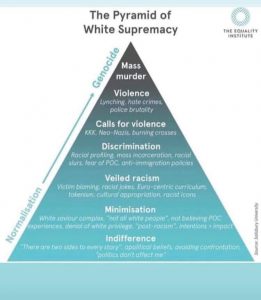 As the emotional dust settles after Friday’s horrific events in Christchurch, we are faced with the questions, how did this happen and how can we ensure it never happens again? Former Race Relations Commissioner Susan Devoy is one of many pointing out that this attack is no surprise to anyone who has been listening – but sadly, the government agencies that should have been, were not. Threats, verbal abuse and myriad subtle forms of racism and hatred are experienced daily by people of colour and other minorities living in New Zealand, and all of this contributes to creating an environment where extreme acts of violence can take place. Maori leaders have spoken out to show solidarity as generational victims of racism. Taika Waititi was not wrong when he described New Zealand as “racist as fuck“. Maori have experienced violent racism since white people first arrived on these islands, and it continues to thrive in various forms, from indifference to active discrimination and violence. This has to change. In the words of of Susan Devoy, “we must never, ever let hatred and racism go unchallenged when we see it in our communities – on a bus, on Facebook, on the street.” Call it out. Don’t let it be normalised.
As the emotional dust settles after Friday’s horrific events in Christchurch, we are faced with the questions, how did this happen and how can we ensure it never happens again? Former Race Relations Commissioner Susan Devoy is one of many pointing out that this attack is no surprise to anyone who has been listening – but sadly, the government agencies that should have been, were not. Threats, verbal abuse and myriad subtle forms of racism and hatred are experienced daily by people of colour and other minorities living in New Zealand, and all of this contributes to creating an environment where extreme acts of violence can take place. Maori leaders have spoken out to show solidarity as generational victims of racism. Taika Waititi was not wrong when he described New Zealand as “racist as fuck“. Maori have experienced violent racism since white people first arrived on these islands, and it continues to thrive in various forms, from indifference to active discrimination and violence. This has to change. In the words of of Susan Devoy, “we must never, ever let hatred and racism go unchallenged when we see it in our communities – on a bus, on Facebook, on the street.” Call it out. Don’t let it be normalised.
At a practical level, it’s heartening to hear Jacinda Ardern immediately signal changes to NZ’s gun laws. I have to admit I thought we already had better gun laws than we do, but it turns out that it’s far too easy to obtain a gun licence – even if you are openly racist – and stockpile weapons. There is no register of gun ownership so no-one has any idea how many guns are owned or where they are. What’s more, semi-automatic weapons are easily, legally, purchased. I can’t understand why anyone needs a semi-automatic weapon (or any weapon, for that matter, unless it’s justified by their line of work). And it gets worse: since 1997, as a result of the 1990 Aramoana massacre, recommended changes to our gun laws have been repeatedly ignored by successive governments. This has to change, and quickly.
But let’s not forget that Friday was also the day of the school students’ march for action on climate change: a clear sign of hope. A new ideology of solidarity and action in the face of a crumbling way of life is emerging out of necessity, from the youth who will be tomorrow’s leaders, tomorrow’s citizens. Russell Norman of Greenpeace NZ, and a former leader of the NZ Green Party, wrote today that the events in Christchurch on Friday 15 March 2019 were “a jarring contrast of hope and hate.” When we could have been celebrating the impressive turnout of young people marching to demand serious action on climate change, the news headlines were abruptly stolen by hatred. We cannot let hatred win. We must prioritise solidarity over division, and together bravely face difficult issues – be it climate change, racism, corporate greed, the failure of capitalism and so on – rather than ignore them. We ignore them at our own collective peril.